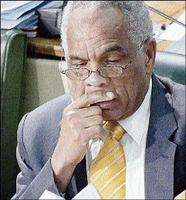
Robert Buddan POLITICS OF OUR TIME Two historic anniversaries are being celebrated this year the founding of the Peoples National Party in September 1938, and the right of all adult Jamaicans to vote (universal adult suffrage) achieved in November 1944 (with the first elections held under adult suffrage in December 1944).
The PNP has just concluded its 70th anniversary annual conference at which its re-confirmed president announced that on the anniversary of adult suffrage, a 70th anniversary committee will be formed to map its direction over the medium term, which I take to mean the next 10 to 15 years.
first post-conference
Anthony Hylton, the partys spokesperson for foreign affairs and foreign trade, has been named chairman of the 70th anniversary committee. Hylton is to be elected (unopposed) as the deputy chairman of the party at todays first post-conference National Executive Council (NEC) meeting. Hylton was instrumental in proposing this idea of a 70th anniversary committee, under which task forces would study and prepare the future direction of the party. He will use his new position as deputy chairman to devote attention to seeing all of this come to fruition.
The party wants to approach this exercise with urgency. Already, Hylton is expected to provide a brief to the president for this NEC about his plans for constituting this anniversary committee and indicating how it would work. Over the next month, the Spokespersons in the shadow Cabinet will nominate their task force members, while the 70th anniversary committee is being set up. A process of broad consultation subsequently will feed into the preparation of what the party calls its Progressive Agenda.
From all of this, it is clear that Mrs Simpson Miller has taken charge in quick time to put the party on a forward footing. It is more and more apparent that the present government is late in recognising and responding to the crises of the day because it was not prepared to read the early warning signs and made election promises that were unrealistic for these times. Its late response to the crisis of crime, belated acknowledgement of the negative impact that the worldwide financial and economic fallout are having on Jamaica and its headlong rush into an economic partnership agreement with Europe, itself in a tailspin, all indicate this. The PNP, on the other hand, had always prided itself on being the thinking man/womans party. Now more than ever it has to prove that it is up to the task.
facing up to reality
Our parties have a choice of facing up to reality or going into denial. The PNP will have to think about the crisis in the world system, crises of finance, business, climate, energy, food, HIV/AIDS, crime and poverty, and what kind of philosophy, programme and democracy the country needs at this time. The Government had chosen instead to go into denial about the repercussions from these overlapping crises until it could no longer do so. At a video conference involving the secretary general and top officials of the United Nations Conference on Trade and Development (UNCTAD), and ministers in the government of our neighbouring Dominican Republic, the subject of the likely impact of the US/world financial crisis and economic recession on the economy of the Dominican Republic came up. The ministers said that the Dominican Republic was well shielded and so the impact will not be great.
The countrys own newspaper reported that the UNCTAD officials exploded in laughter before explaining that dependent economies like those of the Dominican Republic and the Caribbean would be and were already being dragged into the world recession.
They would have exploded in laughter too had our minister of finance, Audley Shaw, told them what he has been telling us, that Jamaica wont be badly affected. Mr Goldings own belated acknowledgement that there is a problem indicates a dose of realism setting in but also shows that the administration is ill-prepared for the crisis since it was never in a state of mind to think in terms of crisis management.
realistic appraisal
It is for this reason, that Dr Omar Davies has chastised the administration for superficial responses to the crisis and called for a full debate in Parliament in order to have a realistic appraisal and the analytical rigour to plan the countrys response and establish the parameters of the economic programme that the country should follow.
The most recent survey of business and consumer confidence states clearly that the economy will be affected and that many firms realise this.
This is not just the usual cyclical downturn that will just go away for us to return to things as they were before. There are lasting structural changes happening because the financial crisis overlaps with others like climate change and energy prices; food production and food prices; and all of these have new implications for the role of the state in regulations and structuring development.
EQUALITY OF OUTCOMES
Rethinking how to make the economy work in a hostile world order goes hand in hand with rethinking how the economy can work best for people like the workers and professionals who work, train and study to improve themselves and their earnings. The PNP is therefore now talking about equality of outcomes. For instance, Dr Fenton Ferguson has pointed out that the breakout in pink eye in several parishes could put a strain on the health sector, while the fallout in international markets can undermine the sustainability of the free-health care policy. In a case like this, the international and domestic crises of finance and health come together to directly affect peoples lives.
This is where the importance of equality of outcomes comes in. Governments invest in education, job creation, job training, health care, transportation and so on to provide equality of opportunity, but the outcome is not in proportion to the investment. We need to find out why students are not learning better, workers are not practising what they have been taught, professionals are not achieving the standards they are trained to achieve, and why in short, the methods and technology of today are not transforming lives and society as they were expected to.
self-reliance
Better outcomes will make us more self-reliant in times of international crises. If we can get more out of what we invest in our health and economic systems, for example, we would not have to depend as much on foreign credit when there is an international financial crisis when credit becomes more expensive. Self-reliance means having the quality of service professionals and institutions right here and getting back from the investments we make as a nation. There must be a way for making the children from the inner-city schools learn as well as those from the private schools.
The methods of social intervention have to be rethought from the basic school to the university level. It is a time for academic disciplines and field experience to reinvent new solutions rather than imitate systems from abroad that are now in crisis themselves. Maybe the progressive agenda will be the one around which to rally.

Anthony Hylton

Dr Omar Davies
Robert Buddan lectures in the Department of Government, University of the West Indies, Mona Campus. Email: Robert.Buddan@uwimona.edu.jm.

